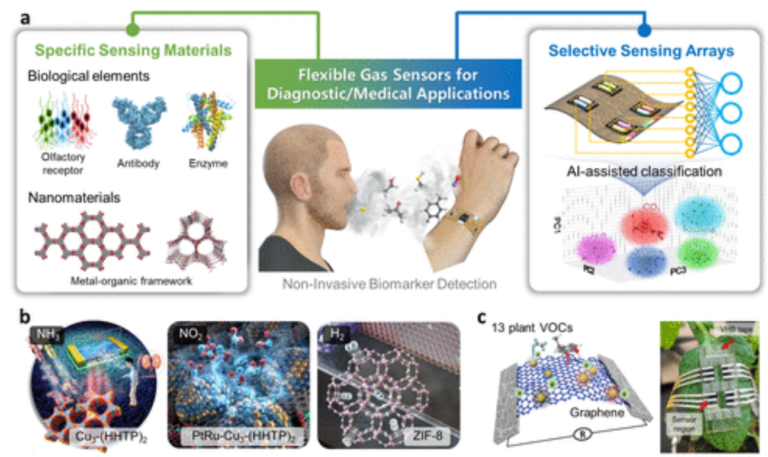Publication

Humans rely increasingly on sensors to address grand challenges and to improve quality of life in the era of digitalization and big data. For ubiquitous sensing, flexible sensors are developed to overcome the limitations of conventional rigid counterparts. Despite rapid advancement in bench-side research over the last decade, the market adoption of flexible sensors remains limited. To ease and to expedite their deployment, here, we identify bottlenecks hindering the maturation of flexible sensors and propose promising solutions. We first analyze challenges in achieving satisfactory sensing performance for real-world applications and then summarize issues in compatible sensor-biology interfaces, followed by brief discussions on powering and connecting sensor networks. Issues enroute to commercialization and for sustainable growth of the sector are also analyzed, highlighting environmental concerns and emphasizing nontechnical issues such as business, regulatory, and ethical considerations. Additionally, we look at future intelligent flexible sensors. In proposing a comprehensive roadmap, we hope to steer research efforts towards common goals and to guide coordinated development strategies from disparate communities. Through such collaborative efforts, scientific breakthroughs can be made sooner and capitalized for the betterment of humanity.
Researcher/Author:
Yifei Luo, Mohammad Reza Abidian, Jong-yun Ahn, Deji Akinwande, Anne M. Andrews, Markus Antonietti, Zhenan Bao, Magnus Berggren, Christopher A. Berkey, Christopher John Bettinger, Jun Chen, Peng Chen, Wenlong Cheng, Xu Cheng, Seon-Jin Choi, Alex Chortos, Canan Dagdeviren, Reinhold H. Dauskardt, Chong-an Di, Michael D. Dickey, Xiangfeng Duan, Antonio Facchetti, Zhiyong Fan, Yin Fang, Jianyou Feng, Xue Feng, Huajian Gao, Wei Gao, Xiwen Gong, Chuan Fei Guo, Xiaojun Guo, Martin C. Hartel, Zihan He, John S. Ho, Youfan Hu, Qiyao Huang, Yu Huang, Fengwei Huo, Muhammad M. Hussain, Ali Javey, Unyong Jeong, Chen Jiang, Xingyu Jiang, Jiheong Kang, Daniil Karnaushenko, Ali Khademhosseini, Dae-Hyeong Kim, Il-Doo Kim, Dmitry Kireev, Lingxuan Kong, Chengkuo Lee, Nae-Eung Lee, Pooi See Lee, Tae-Woo Lee, Fengyu Li, Jinxing Li, Cuiyuan Liang, Chwee Teck Lim, Yuanjing Lin, Darren J. Lipomi, Jia Liu, Kai Liu, Nan Liu, Ren Liu, Yuxin Liu, Yuxuan Liu, Zhiyuan Liu, Zhuangjian Liu, Xian Jun Loh, Nanshu Lu, Zhisheng Lv, Shlomo Magdassi, George G. Malliaras, Naoji Matsuhisa, Arokia Nathan, Simiao Niu, Jieming Pan, Changhyun Pang, Qibing Pei, Huisheng Peng, Dianpeng Qi, Huaying Ren, John A. Rogers, Aaron Rowe, Oliver G. Schmidt, Tsuyoshi Sekitani, Dae-Gyo Seo, Guozhen Shen, Xing Sheng, Qiongfeng Shi, Takao Someya, Yanlin Song, Eleni Stavrinidou, Meng Su, Xuemei Sun, Kuniharu Takei, Xiao-Ming Tao, Benjamin C. K. Tee, Aaron Voon-Yew Thean, Tran Quang Trung, Changjin Wan, Huiliang Wang, Joseph Wang, Ming Wang, Sihong Wang, Ting Wang, Zhong Lin Wang, Paul S. Weiss, Hanqi Wen, Sheng Xu, Tailin Xu, Hongping Yan, Xuzhou Yan, Hui Yang, Le Yang, Shuaijian Yang, Lan Yin, Cunjiang Yu, Guihua Yu, Jing Yu, Shu-Hong Yu, Xinge Yu, Evgeny Zamburg, Haixia Zhang, Xiangyu Zhang, Xiaosheng Zhang, Xueji Zhang, Yihui Zhang, Yu Zhang, Siyuan Zhao, Xuanhe Zhao, Yuanjin Zheng, Yu-Qing Zheng, Zijian Zheng, Tao Zhou, Bowen Zhu, Ming Zhu, Rong Zhu, Yangzhi Zhu, Yong Zhu, Guijin Zou, and Xiaodong Chen*
Published in: ACS Nano 2023, 17, 6, 5211–5295
https://doi.org/10.1021/acsnano.2c12606
- Home
- Technology Roadmap for Flexible Sensors
Singapore Hybrid-Integrated Next-Generation μ-Electronics (SHINE) Centre
- Block E6, #E6-5-3, 5 Engineering Drive 1, Singapore 117608
- +65 6601 8522
- shine@nus.edu.sg

